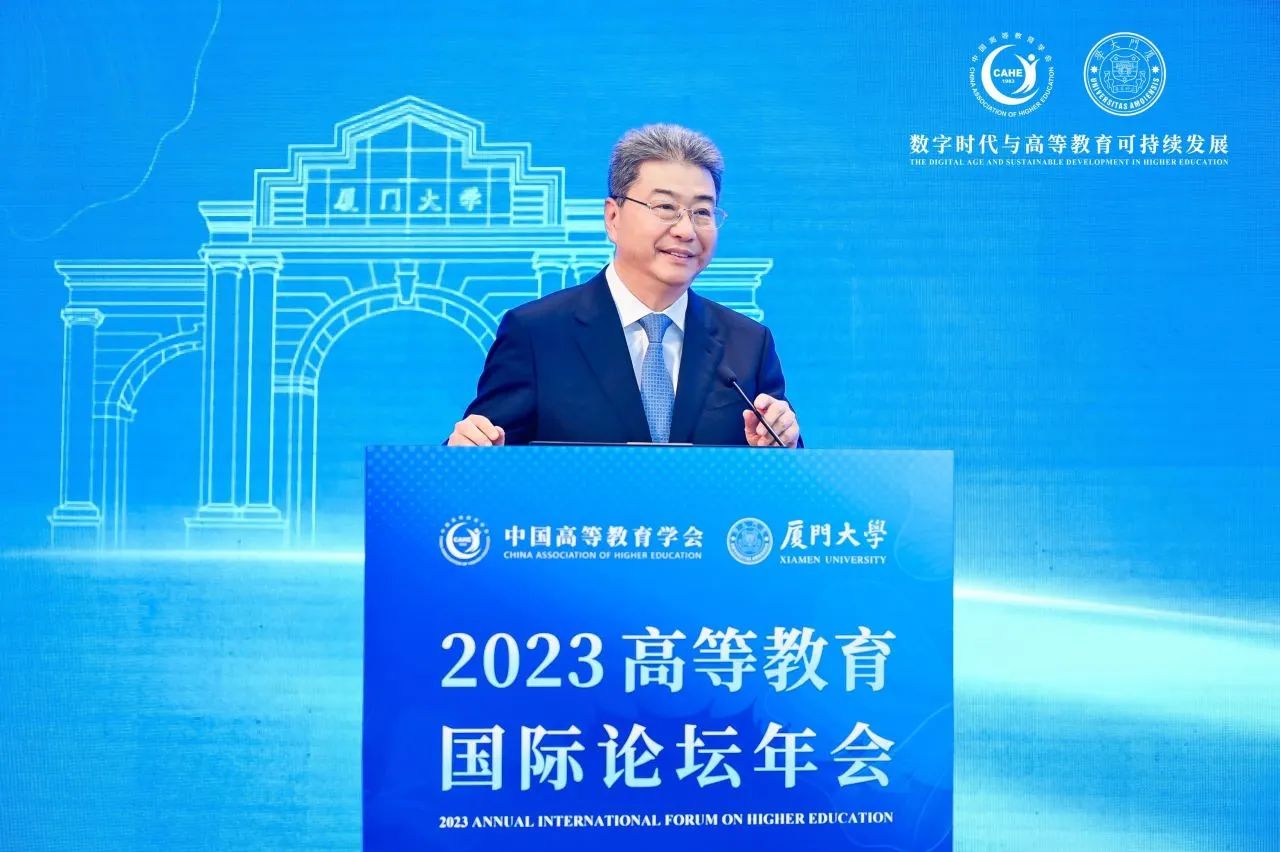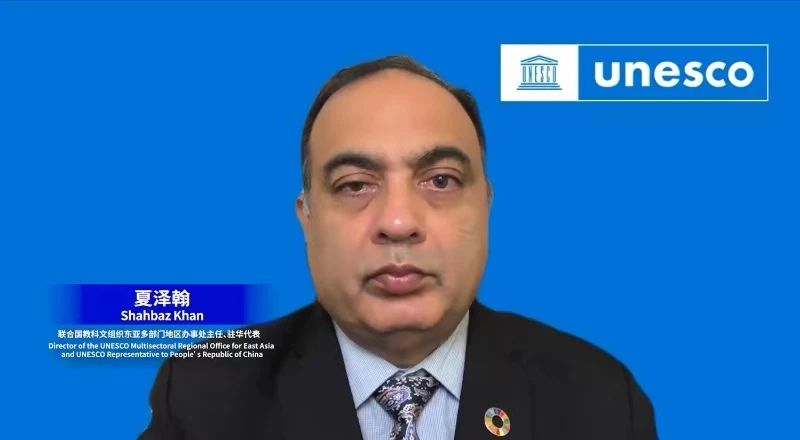2023 Annual International Forum was held at Xiamen University on Dec. 10, focusing on the theme “Sustainable Higher Education in the Digital Era.” The event attracted over 800 representatives from nearly 30 countries and territories.
Present at the ceremony were Wu Yan, Vice Minister of the Ministry of Education of the People's Republic of China; Zhang Yan, member of the Standing Committee and minister of the Publicity Department of the CPC Fujian Provincial Committee; Zhang Rong, Academician of the Chinese Academy of Sciences and Vice Chair of the Xiamen University Committee; and Shahbaz Khan, Director of the UNESCO Multisectoral Regional Office for East Asia and UNESCO Representative to the People's Republic of China.
Wu Yan, Member of the Party Leadership Group and Vice Minister of the Ministry of Education; Zhang Yan, Member of the Standing Committee of the CPC Fujian Provincial Committee and Director of the Publicity Department; and Zhang Rong, Member of the Chinese Academy of Sciences (CAS) and Secretary of the CPC Committee of Xiamen University, attended the forum and delivered speeches. Shahbaz Khan, Director of the UNESCO Multisectoral Regional Office for East Asia and Representative to China, delivered a video speech. Vice Presidents of the Chinese Society of Higher Education (CSHE) in attendance, who also delivered reports, included: Zhao Changlu, Secretary of the CPC Committee of Beihang University; Zhang Jun, Member of the Chinese Academy of Engineering (CAE) and Secretary of the CPC Committee of Beijing Institute of Technology; Li Yuanyuan, Member of the CAE and former Secretary of the CPC Committee of Huazhong University of Science and Technology; and Yan Chunhua, Member of the CAS and President of Lanzhou University. Also delivering reports were: Zhang Donggang, Secretary of the CPC Committee of Renmin University of China; Qiu Xin, Secretary of the CPC Committee of Fudan University; Ren Shaobo, Secretary of the CPC Committee of Zhejiang University; Zhang Zongyi, President of Xiamen University; and Zhou Congzhao, Vice President of the University of Science and Technology of China. Other CSHE Vice Presidents present included: Guan Peijun, former Vice Minister-level Full-time Committee Member of the State Ethnic Affairs Commission; Zhang Daliang, former Director-General of the Department of Higher Education of the Ministry of Education; and Jiang Enlai, Secretary-General of CSHE. Also in attendance were: Wu Daguang, Deputy Director of the Xiamen University Council; Sun Weijie, CSHE Supervisor General and former Secretary of the CPC Committee of the Jilin Provincial Department of Education and Secretary of the Provincial Working Committee of Universities; Zhou Dawang, Director-General of the Department of Science, Technology and Informatization of the Ministry of Education; Wu Shixing, Deputy Director-General of the Department of Higher Education of the Ministry of Education; Ye Shen, Secretary of the Education Work Committee of the CPC Fujian Provincial Committee and Director of the Fujian Provincial Department of Education; and Liao Huasheng, Vice Mayor of Xiamen Municipal People’s Government. Lin Huiqing, CSHE Vice President and former Member of the Party Leadership Group and Vice Minister of the Ministry of Education, presided over the forum’s opening ceremony. Two other CSHE Vice Presidents chaired the morning plenary session: Jiang Zhiying, Secretary of the CPC Committee of Jilin University; and Ge Daokai, former Secretary of the Education Work Committee of the CPC Jiangsu Provincial Committee and former Director of the Jiangsu Provincial Department of Education.
Ashraf Mohamed Shoeib, former Minister of Higher Education and Scientific Research of Egypt and President of Badr University; Nicola Clayton, Fellow of the Royal Society and Professor at the University of Cambridge; Petchsawat Domina, Advisor to the Minister of Higher Education, Science, Research and Innovation of Thailand; Olusola Oyewole, Secretary-General of the Association of African Universities; Andrew Karam, Executive Vice Chancellor of Wenzhou-Kean University; Robin Seymour Rowe, Chair of the ITU-T Focus Group on Metaverse for Healthcare; and Andrew Thompson, Professor at the University of Wisconsin-Stevens Point, attended the forum and delivered reports. More than 80 overseas guests from nearly 30 countries and regions participated in the forum in person. They represented international organizations, embassies and consulates in China, educational institutions, university presidents, and experts and scholars.

Wu Yan emphasized that creating a digital China is important to advancing the country’s modernization and creating new national advantages. He emphasized that educational digitization is a critical and necessary response to the ongoing technological and industrial revolutions, as it promotes higher quality and more equitable education. As an example of China’s digital education strategy, Wu brought attention to the country’s massive online teaching system and the world’s largest national higher education smart education platform, both of which showcase China’s experiences in MOOCs and online education. The vice minister emphasized that digitization is a driving force shaping the future of education. He presented several major proposals, including reshaping teaching ecosystems through educational digitization, empowering teachers through digital tools, leveraging data for precise educational governance, and fostering international collaboration in educational digitization.

Zhang Yan stated in his address that the Communist Party of China Fujian Provincial Committee and the People's Government of Fujian Province have consistently prioritized higher education reform and high-quality development. He noted that universities have effectively served as crucial hubs for talent development and scientific innovation, achieving notable results in faculty development, student cultivation, and research outcomes. Stressing that digital transformation in higher education represents both an inevitable trend and a key mission, he called for leveraging digital technologies to advance educational reform, enhance international cooperation, and meet evolving demands for educational quality, lifelong learning, and modern governance—ultimately cultivating more innovative, interdisciplinary talent for the digital era.

Zhang Rong noted that Xiamen University, as a “Double First-Class” institution, has long played a significant role in higher education theory and practice while accumulating experience in digital education. The university has prioritized digital development as a key growth strategy, enhancing system design, curriculum development, and teacher training to deeply integrate digital technology into education. Looking ahead, he aspires to collaborate with global universities to provide quality educational resources, build a learning society, and develop more open and resilient higher education institutions. He emphasized the commitment to cultivating interdisciplinary talents for the new era, thereby contributing to the UN 2030 Sustainable Development Goals and the betterment of global society.

Shahbaz Khan expressed his appreciation for the Chinese government's proactive approach in reforming higher education. He suggested that in this era of unprecedented technological advancements, including artificial intelligence, robotics, 3D printing, cloud computing, 5G, and the Internet of Things, we need to find ourselves in new ways of how innovation and sustainability can go together. He also stressed that academic exchange is a new form of inter-university collaboration and resource sharing, and we should fully utilize digital platforms and e-learning opportunities.
During the morning plenary session, focusing on the theme “Educational Reform and Future Development in the Digital Age”, Nicola Clayton delivered a report titled “Digitalization and Education for Sustainable Development”, Qiu Xin on “Paradigm Shift: AI Empowering the High-Quality Development of Higher Education”, Zhang Jun on “Green Education Driving the High-Quality Development of Higher Education”, Zhang Donggang on “Leading the Modernization of Higher Education in the New Era through Educational Digitalization”, Petchsawat Domina on “The Digital Age and the Sustainable Development of Higher Education”, Yan Chunhua on “Empowering the High-Quality Development of Higher Education in Western China through Digitalization”, Robin Seymour Rowe on “Digital Education in the WHO Academy MCARE Project”, Ashraf Mohamed Shoeib on “The Transformative Power of Digitalization in Higher Education”, and Andrew Thompson on “The Reform and Future Development of Higher Education”; centering on the theme “Reform and Innovation in Talent Cultivation Models”, Zhao Changlu spoke on “Interdisciplinarity and Synergy: Reflections on Organizational Philosophy Based on University Disciplinary Characteristics”, Ren Shaobo on “Digital Reform: Empowering the Late-Mover Advantage in Building World-Class Universities”, Andrew Karam on “AI-Driven Global Talent Cultivation: Education Beyond Technical Skills”, and Zhang Zongyi on “Challenges of the Digital Age to Talent Cultivation in Higher Education”; regarding the theme “Universities’ Responsibilities and Missions in International Exchange and Cooperation”, Li Yuanyuan presented a report titled “Promoting High-Quality International Exchanges and Cooperation to Jointly Address Common Challenges of Mankind”, Olusola Oyewole on “Fostering Cooperation with the Association of African Universities”, and Zhou Congzhao on “Innovation in Inheritance: Undergraduate Teaching at the University of Science and Technology of China”.
At the afternoon plenary session, the forum was chaired by three individuals: Zhou Yu, Vice President of the Chinese Society of Higher Education (CSHE), Member of the Chinese Academy of Engineering (CAE), and former President of Harbin Institute of Technology; Ma Luting, Deputy Director and Secretary-General of CSHE’s Academic Development Advisory Committee (ADAC) and former Vice President of the National Institute of Education Sciences; and Bie Dunrong, Member of CSHE’s ADAC and Dean of the Institute of Education at Xiamen University. Presentations were delivered by speakers including Zhang Wei, Deputy Director of CSHE’s ADAC and former Secretary of the CPC Committee of Northwestern Polytechnical University; Kathleen Wellard, Minister-Counsellor at the Australian Embassy in China; Yang Jun, Vice President of Chongqing University; Yasar Ayaz, Chairman and Fellow of the National Center of Artificial Intelligence at Pakistan’s National University of Sciences and Technology; Xu Yuan Ma, Vice Rector of the University of Macau; and Milica Vukotić, Vice Rector of the University of Montenegro (Nikšić).
During the afternoon roundtable discussion, exchanges and remarks were made by participants such as: Shi Jinghuan, Member of CSHE’s ADAC and Vice Chair of the 12th Degree Evaluation Committee of Tsinghua University; Liu Haifeng, Director of the Center for Imperial Examination and Education Research at Zhejiang University; Yan Guangcai, Director of the Institute of Higher Education at East China Normal University; Zhang Yingqiang, Professor at the School of Education of Zhejiang University; David Hu, Associate Dean at Rochester Institute of Technology; Martins dos Santos Vilakulo Leita, Rector of the Open University of Mozambique; Chen Xiaochun, President of the World Federation of United Nations Associations (WFUNA) and Chairman of the Board of Sias University (Zhengzhou); Zhou Weili, Vice President of Hong Kong Baptist University; Kabiru Bala, Vice Chancellor of Ahmadu Bello University; Craig Anthony Albrighton, Vice Principal of Nanyang Institute of Management (Singapore); Xia Wei, Representative of the Rector for Asia at Polytechnic University of Madrid; John Baruch, Professor at Leeds Beckett University; Fred Dallmayr, Vice Chancellor for Academic Affairs at Duke Kunshan University; and Alberto Noyola Robles, Director of the Office of the National Autonomous University of Mexico (UNAM) in China.
The 2023 Annual International Forum is a flagship event of the China Higher Education Society, with 22 successful sessions to date. Co-hosted by the China Association of Higher Education and Xiamen University with support from the Fujian Provincial Department of Education, and co-organized by the Center for Higher Education Research of Xiamen University,this year’s forum reflected the global commitment to advancing education through digital innovation.
Source: China Association of Higher Education
Translate by: Lin Hanying